HOPE not hate uses cookies to collect information and give you a more personalised experience on our site. You can find more information in our privacy policy. To agree to this, please click accept.
Reform UK have slid further and further to the radical right in the past 6 years – using hard right populism to attract voters.
It would be easy to think that Farage represents just one issue – immigration. But the Reform UK agenda is far more ambitious and broad-ranging than previous efforts from Farage which solely focused on Brexit and immigration.
The party have claimed they will keep “woke ideologies out of the classroom”, abolish the licence fee, leave the European Convention of Human rights, scrap net zero plans and increase drilling for gas and oil.
Earlier this year, we polled 25,000 voters ahead of the election and we examined what made Reform UK voters tick. Unsurprisingly 60% identified as “anti-woke”, 46% have very negative attitudes towards climate-change activists (in fact 41% think that climate change is not happening or are not sure) and over half would prefer a strong leader with the power to ignore or override Parliament, while 41% support the claim that “in certain circumstances, violence can be necessary to defend something you strongly believe in.”
As examined in our latest report looking at the threat of far-right and populist movements across Europe – populist messages like that of Reform UK’s are slowly undermining the essential institutions which prop up our liberal democracy.
Reform UK could become the unofficial opposition after the election, perhaps not in Parliament but in communities up and down the country. While they draw initial support from Conservative voters, they are also likely to increasingly attract Labour voters who may feel frustrated with the pace of change of any incumbent Labour government.
Some Labour activists will be celebrating Farage’s return to frontline politics as the final nail in the coffin of the Conservative party but it’s clear Farage’s eyes aren’t on this election but the next one.
Farage was clear on Monday, “The real plan is to be the opposition party in the next Parliament and the biggest party at the 2029 general election”.
And Reform UK will see a much-needed boost at this election – polls before Farage entered the race already predicted a near-total collapse in Conservative support – now those unconvinced by Labour will find they have somewhere else to go. There’s also the chance that Conservative MPs and candidates are tempted to jump ship. HOPE not hate have catalogued the extreme radical right on the Conservative Party including the likes of Tom Hunt and Andrea Jenkyns.
But it’s not just their electoral success that matters here. Farage has an uncanny ability to direct the whole Westminster lobby in whichever direction he likes and with just one seat in parliament he can exert influence on the outcome of the next Conservative leadership election too. A battle is about to take place within the Conservative Party and at the time of writing, Kemi Badenoch is bookies favourite, with Priti Patel, Penny Mordaunt, and Suella Braverman also in the running.
A strong populist and radical right in Westminster would have huge ramifications for a Labour Government. In March HOPE not hate warned of the growing mood of pessimism in Britain. When asked to describe modern Britain, 43% of respondents chose the word “declining” closely followed by “weak”.
The British public are impatient for change and there is a slim window of time after this election for a new Government to convince people that their lives, and Britain, are changing for the better. Otherwise, we will continue to see a rejection of our institutions and people turning towards radical right politics for solutions.
Our polling suggests that in particular a new government needs to set out answers and turn around results when it comes to the cost of living crisis, the NHS, and the economy more generally.
Our polling revealed that 55% of people still think immigration has been good for Britain. It’s clear that attitudes towards immigration are more nuanced than many politicians and commentators think. People want to live in a society that is thriving and fair.
All this means that Labour must resist the temptation to chase votes to the right.
With Farage reentering frontline politics, he attracts a cast of far-right activists and content creators back into the fold.
Since announcing he would stand in Clacton, far-right activists have come out of the woodwork keen to support, many who have long given up on achieving electoral success.
Tommy Robinson, off the back of a demonstration at the weekend that attracted an estimated 6000 protestors, tweeted Farage asking if he could join Reform UK.

Tristian Tate, brother of Andrew Tate, who is currently on trial in Romania for accused of human trafficking, has offered young men a chance to win $5000 if they send him proof they have voted for Reform UK.
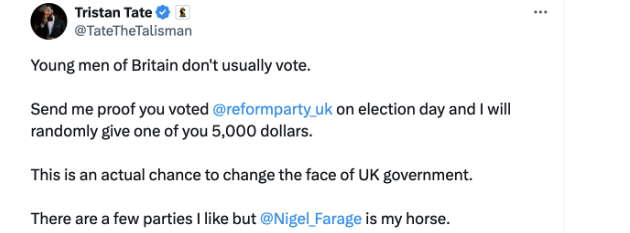
Paul Golding, Co-Leader of Britain First, who have announced they will not contest a single seat at the General Election said Farage standing was brilliant as it “guarantees the destruction of the Tories” and “releases the working classes from having to vote Labour”.
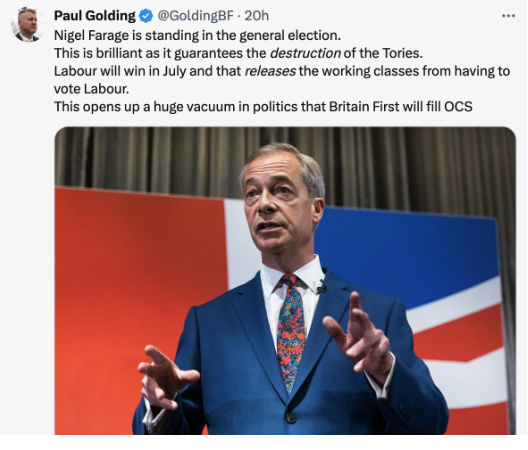
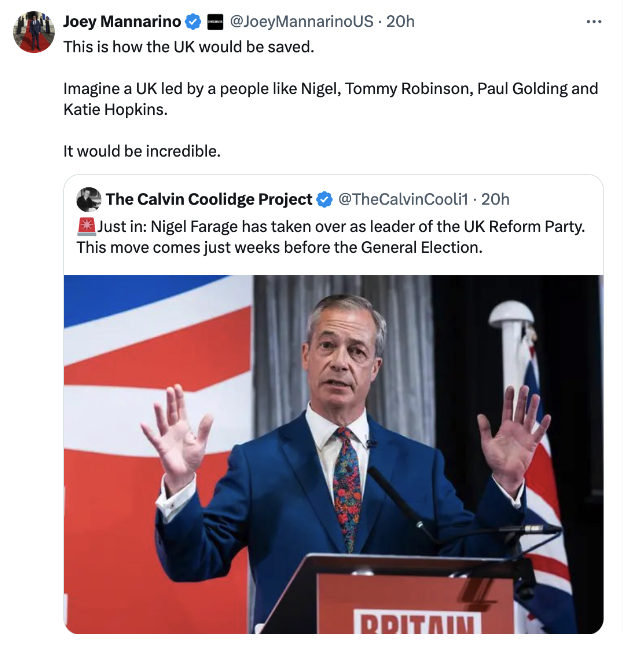
And it’s no surprise Farage has elicited such responses. Farage has made extreme friends on a global level. Farage openly supported Marine le Pen, leader of the far-right National Front (since renamed National Assembly), and has lent his support to Germany’s AfD saying “I’ve watched the rise of the AfD with fascination, with interest, and I’ve been cheering on from the sidelines”.
Farage hasn’t disguised his love for Trump’s America as he originally rejected a return to frontline politics in the UK to focus on the US’ November election. Farage has made countless appearances on InfoWars, the American conspiracy show run by far-right pundit Alex Jones.
The response to Farage needs to be strong and bold. Safety-first politics, where politicians say as little as possible to avoid leaving themselves open to attack, will not work against Farage. In fact, it will only encourage him further and allow him to differentiate himself from the political mainstream. It’s crucial that we tackle him on his lies and simplistic answers to complex issues. Ignoring him and avoiding supposed ‘complex’ issues will only allow him to dominate the narrative and present himself as a brave and fearless politician.
Farage poses a serious threat to community cohesion in this country, just as his rhetoric and views challenge the basic tenets of liberal democracy. He needs to be defeated, and defeated politically, both in this election and beyond.
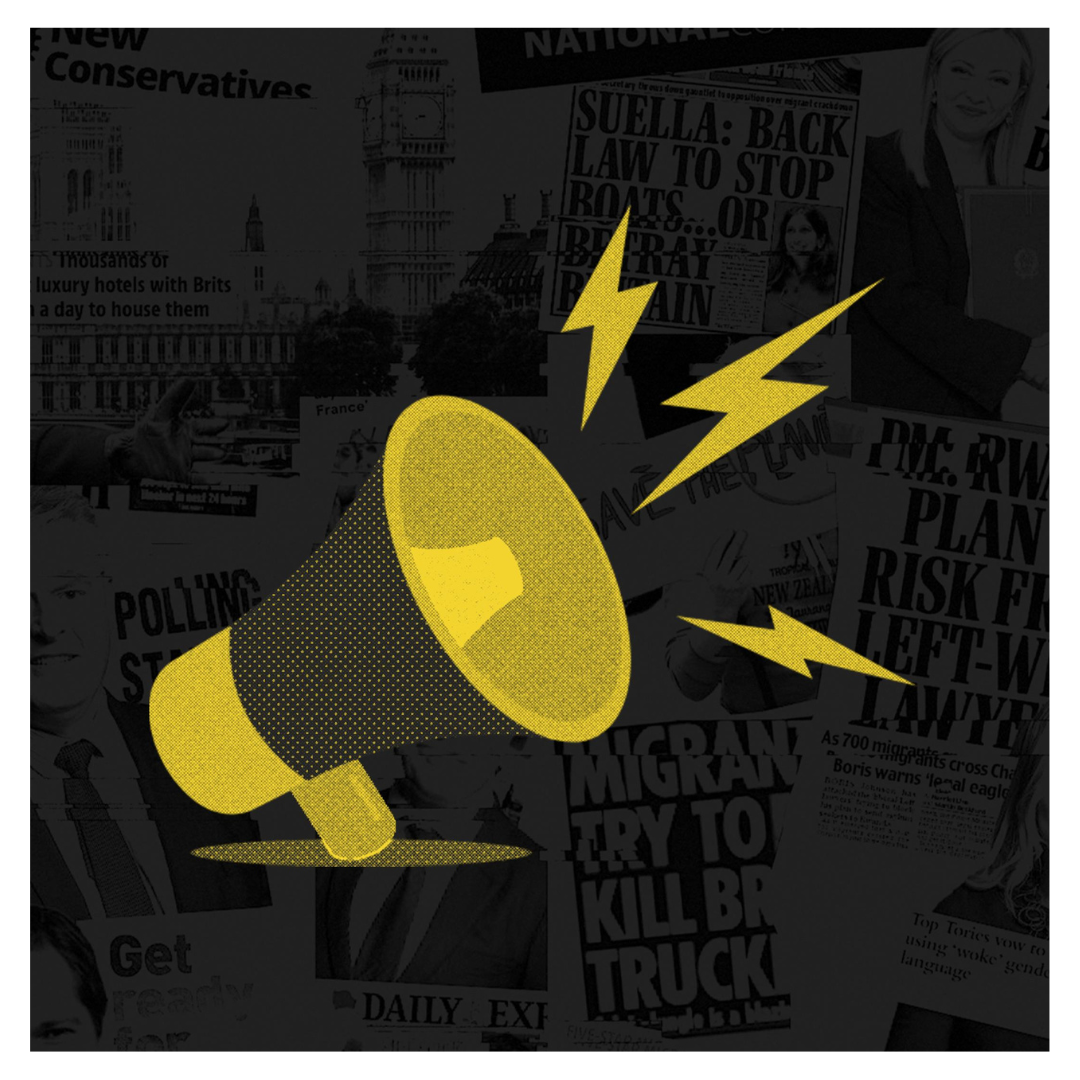
Help our campaign against Farage and Reform UK by chipping in today. Your contribution can make all the difference.
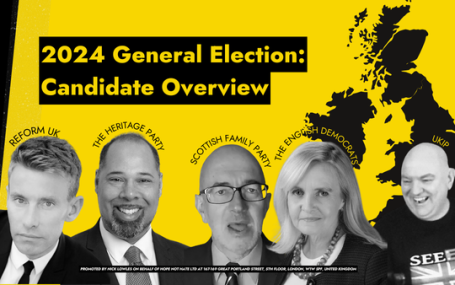
When voters go to the polls on July 4th, they will choose between a record number of candidates. This year, 4,515 people are contesting parliamentary…